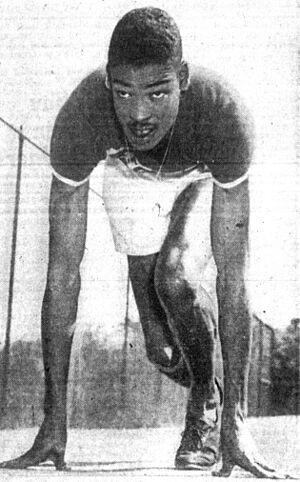Andy Stanfield facts for kids
| Medal record | ||
|---|---|---|
| Men's athletics | ||
| Representing the |
||
| Olympic Games | ||
| Gold | 1952 Helsinki | 200 metres |
| Gold | 1952 Helsinki | 4x100 m relay |
| Silver | 1956 Melbourne | 200 metres |
Andrew William Stanfield (born December 29, 1927 – died June 15, 1985) was an American sprinter. He was an amazing Olympic athlete. He won two gold medals and one silver medal at the Olympic Games.
Who Was Andy Stanfield?
Andy Stanfield was born in Washington, D.C.. When he was a child, his family moved to Jersey City. He went to Lincoln High School. Even in high school, he was a very talented athlete. He was great at short races (sprints) and the long jump.
After serving in the army, Stanfield went to Seton Hall University in 1948. The next year, he started winning many national titles. He won six titles from the AAU. He also won nine IC4A titles, both indoors and outdoors. His coach was Johnny Gibson, who used to hold a world record in the 400-meter hurdles.
Stanfield's Amazing Races
Andy Stanfield was especially strong in the 200-meter race. In 1951, he set a new world record for the 200-meter race. He ran it in 20.6 seconds. This was a special kind of 200-meter race. It was run on a track with a turn, not a straight line.
Before Stanfield, the world record for the 200-meter race on a turn was 21.2 seconds. This record was set way back in 1914. Stanfield's time of 20.6 seconds was much faster! He proved how fast he was by matching this record twice more. He ran 20.6 seconds again in 1952 and 1956.
Olympic Glory
Because he was the world record holder, it wasn't a surprise when Stanfield won a gold medal at the 1952 Summer Olympics in Helsinki. He won the 200-meter race. He even tied the Olympic record in the final race!
But that wasn't his only gold medal. Stanfield was also part of the American 4 x 100 m relay team. This team won another Olympic gold medal. It was a fantastic achievement!
Stanfield tried to win the 200-meter title again at the 1956 Summer Olympics in Melbourne. He ran a great race, but he finished second. He won a silver medal this time, losing to Bobby Morrow.
Andy Stanfield was also a member of the Alpha Phi Alpha fraternity.
 | May Edward Chinn |
 | Rebecca Cole |
 | Alexa Canady |
 | Dorothy Lavinia Brown |


